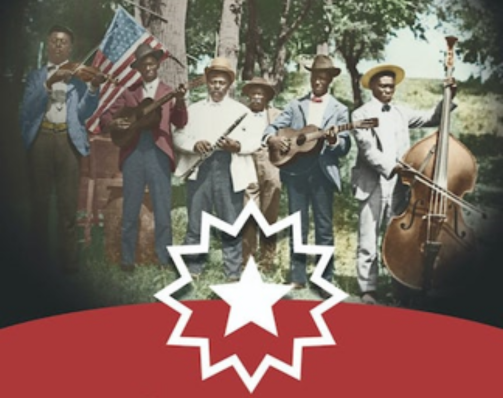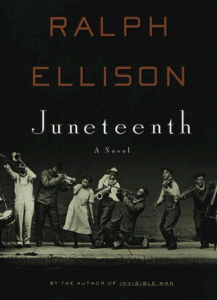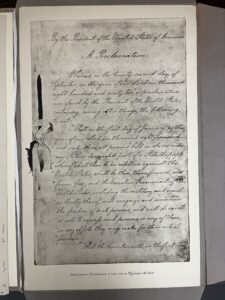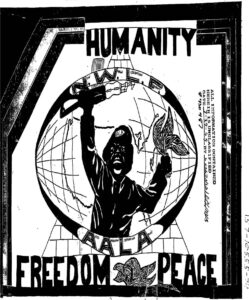
On June 19, 1865, Union troops arrived in Galveston, Texas with the news that the more than 250,000 enslaved people in the state were free. This day came to be known as Juneteenth and is now officially a federal holiday.
To honor the hardships and enduring spirit that led up to this historic day that brought about a new era of hope, inspiration and empowerment, we invite you to check out the following Special Collections materials, books, databases, streaming resources and other items that span the 19th, 20th and 21st centuries.
Be advised: Some of these items use outdated and potentially offensive terminology. Please note that The Claremont Colleges Library is committed to creating inclusive physical and virtual spaces where people from all backgrounds and experiences are welcome, safe and respected. You can learn more about these efforts here, including recent highlights about the work of our Inclusive Metadata Taskforce.
Books
 Juneteenth: The Story Behind the Celebration (2021) by Edward T. Cotham is the first scholarly book to look at the history of Juneteenth. Using decades of research in archives around the nation, this book helps separate myth from reality and tells the story behind the celebration in a way that provides new understanding and appreciation for the event.
Juneteenth: The Story Behind the Celebration (2021) by Edward T. Cotham is the first scholarly book to look at the history of Juneteenth. Using decades of research in archives around the nation, this book helps separate myth from reality and tells the story behind the celebration in a way that provides new understanding and appreciation for the event.
Ralph Ellison’s unfinished work, Juneteenth: A Novel, issued posthumously, tells the story of a Black man who passes for white and becomes a race-baiting U.S. senator. When he is shot on the Senate floor, the first visitor in hospital is a Black musician-turned-preacher who raised him. As the two men talk, their respective stories come out.
Twelve Years a Slave: Narrative of Solomon Northup, a Citizen of New-York, Kidnapped in Washington City in 1841, and Rescued in 1853, from a Cotton Plantation near the Red River, in Louisiana (1853) by Solomon Northup describes the life in slavery of Solomon Northup who was born a free Black man. This edition includes frontispiece and plates*. The book was later adapted for the screen in 2013. Directed by Steve McQueen with screenplay by John Ridley, the film won several awards and featured a cast including Chiwetel Ejiofor, Michael Fassbender, Benedict Cumberbatch, Brad Pitt and Lupita Nyong’o.
 Freedom: A Fable: A Curious Interpretation of the Wit of a Negress in Troubled Times with illustrations (1997) by Kara Walker is an illustrated pop-up book that calls upon the history of anti-Black imagery in the U.S. to make a commentary on the ways racism has endured. Appearing to be a Civil War-era story, the book follows a formerly-enslaved woman after emancipation, but it quickly becomes evident that freedom and liberation for Black folks in the U.S. is an ongoing fight.
Freedom: A Fable: A Curious Interpretation of the Wit of a Negress in Troubled Times with illustrations (1997) by Kara Walker is an illustrated pop-up book that calls upon the history of anti-Black imagery in the U.S. to make a commentary on the ways racism has endured. Appearing to be a Civil War-era story, the book follows a formerly-enslaved woman after emancipation, but it quickly becomes evident that freedom and liberation for Black folks in the U.S. is an ongoing fight.
The Emancipation Proclamation (1950) facsimile reproduces the original document held at the National Archives. President Abraham Lincoln issued the Emancipation Proclamation on January 1, 1863, on the eve of the nation’s third year of the civil war. Despite the extensive promise of freedom, the document had limitations, although it transformed the character of the war. From that day on, every advance of federal troops expanded the domain of freedom. The Proclamation also announced the acceptance of Black men into the Union Army and Navy, enabling the liberated to become liberators – nearly 200,000 Black soldiers and sailors took up arms for the cause of liberty.
Databases
 The Black Liberation Army and the Program of Armed Struggle database, consisting mostly of FBI documents, offers a look into the enduring Black struggle for freedom. The Civil War, Emancipation Proclamation and Juneteenth are rightfully celebrated for bringing an end to slavery in the U.S., but this database serves as a powerful reminder that efforts for equality continued into the late 20th century.
The Black Liberation Army and the Program of Armed Struggle database, consisting mostly of FBI documents, offers a look into the enduring Black struggle for freedom. The Civil War, Emancipation Proclamation and Juneteenth are rightfully celebrated for bringing an end to slavery in the U.S., but this database serves as a powerful reminder that efforts for equality continued into the late 20th century.
The African American Newspapers 1827-1998 database offers an extensive collection of hundreds of fully digitized 19th- and 20th-century African American newspapers to read more about the history of Juneteenth celebrations and the Black experience overall. Check out this Freemen article on a Juneteenth celebration in Sherman, TX in 1908, or this snippet from the Parsons Weekly Blade, describing an 1895 Juneteenth celebration in Parsons, KS that featured speeches and a baseball game!
Soon-to-be-Available Resources
The Library recently acquired two new perpetual resources that will soon be available for research. These include: Southern Life and African American History, 1775-1915: Plantations Records, Parts I and II and Black Abolitionist Papers, 1830-1865. Please stay tuned and follow our socials (Facebook, Instagram, Twitter) to learn when these become available to explore.
Students, faculty and staff can also find more resources by exploring the Library’s research guides:
- The African American section of the US History Guide
- The Civil Rights section of the US History Guide
- The Africana Studies Guide
If you are interested in examining any of these materials or have questions, you can reach out to our subject librarians or contact Special Collections.
– – – – –
*A frontispiece is a decorative or informative illustration facing a book’s title page. Plates are full page illustrations, pictures or photographs that are printed separately from the text of the book and then bound in during production. These features add detail, color and texture to books.